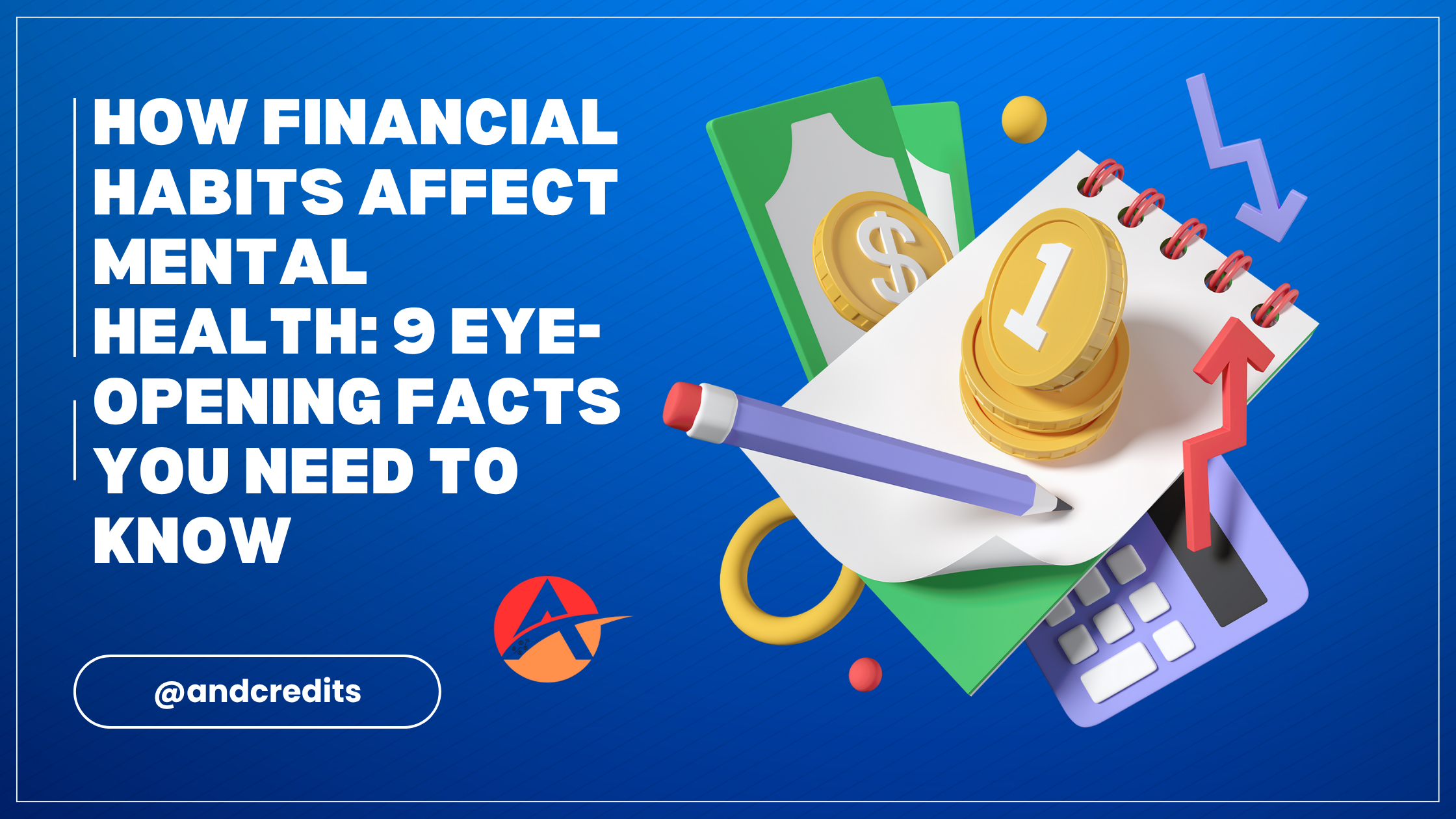Table of Contents
Introduction
Why financial habits have a bigger impact on mental health than many realize
Many people view money purely as a practical matter — something that’s about numbers, budgets, and bank accounts. But the truth is, your financial habits can have a huge impact on your emotional and mental well-being. How you manage your money affects your stress levels, relationships, self-esteem, and even your physical health. Whether it’s the constant worry of living paycheck to paycheck or the calm that comes from having an emergency fund, your day-to-day money behaviors shape how you feel.
Thank you for reading this post, don't forget to subscribe!
The link between money management and emotional well-being
Positive financial habits — like budgeting, saving regularly, and managing debt — can reduce anxiety, build confidence, and promote a sense of security. On the other hand, poor habits — such as overspending, ignoring debt, or avoiding financial planning — can lead to stress, depression, sleep problems, and strained relationships. Understanding this connection is the first step toward improving both your finances and your mental health.
Quick preview of the 9 eye-opening facts revealed in this guide
In this post, we’ll explore 9 powerful ways your financial habits affect mental health — and show you how making small changes to your money routines can help you feel happier, healthier, and more in control of your life. Let’s dive in!
1. Poor Financial Habits Can Increase Anxiety and Stress
How overspending, debt, and lack of budgeting create financial stress
Poor financial habits — such as spending more than you earn, carrying high-interest debt, or avoiding a monthly budget — often lead to a cycle of stress. When you’re unsure how much you’re spending or whether you can pay your bills, it’s hard to feel secure or in control. This uncertainty can trigger a constant state of financial anxiety.
The mental health toll of constantly worrying about money
Financial stress is one of the most common sources of anxiety in adults. It can lead to chronic worry, sleepless nights, mood swings, and even depression. The pressure of unpaid bills, looming debt, or not having enough saved for emergencies weighs heavily on mental health — often leading people to feel overwhelmed or stuck.
Why mindful financial habits can reduce anxiety
Creating a simple budget, tracking expenses, and paying down debt are powerful ways to ease money-related stress. When you actively manage your finances, you replace uncertainty with clarity. Just the act of organizing your finances can give you a sense of control — which naturally reduces anxiety and boosts peace of mind.
2. Good Financial Habits Build Confidence and Self-Esteem
The positive mental boost of mastering your finances
Developing strong financial habits doesn’t just help your bank account — it builds your confidence. Knowing that you can pay your bills, handle unexpected costs, and save for your goals gives you a sense of pride and independence. It affirms your ability to take care of yourself and your future.
How saving, budgeting, and investing improve self-worth
When you save consistently, stick to a budget, or watch your investments grow, you experience tangible proof of your discipline and progress. These wins — no matter how small — boost your self-esteem. You start to see yourself as capable and forward-thinking, which positively affects how you show up in all areas of life.
The link between financial control and emotional resilience
People who feel in control of their finances tend to handle life’s challenges with more emotional resilience. They’re less likely to feel panicked during unexpected expenses and more likely to approach problems with a calm, solution-focused mindset. This sense of control over money translates into greater control over your emotional state too.
3. Debt Can Lead to Depression
The heavy emotional burden of being in debt
Carrying debt — especially high-interest credit card debt or personal loans — can create a deep emotional burden. It often triggers feelings of guilt, shame, and hopelessness. The more debt you accumulate, the more trapped you may feel, which can erode your mental health.
How chronic debt affects mood and mental health
Research shows that chronic debt is strongly linked to symptoms of depression. The constant reminder of unpaid balances and minimum payments can lead to persistent sadness, lack of motivation, and even physical symptoms like fatigue.
Why improving debt management is key for mental well-being
Taking steps to manage and pay down debt can dramatically lift your mood and reduce feelings of depression. Simple changes — like creating a debt repayment plan or consolidating debt for lower interest — give you a sense of progress and hope.
4. Lack of Emergency Savings Increases Fear and Uncertainty

The anxiety of being unprepared for financial emergencies
Living without an emergency fund means you’re one unexpected expense away from financial disaster. This uncertainty fuels constant low-grade anxiety because you know that car repairs, medical bills, or job loss could instantly upend your life.
How building an emergency fund provides peace of mind
Saving even a small emergency cushion can provide tremendous emotional relief. Knowing you have funds available for the unexpected helps you feel more secure and less reactive to life’s financial curveballs.
The role of savings in emotional security
An emergency fund isn’t just about money — it’s about confidence and peace of mind. It gives you the emotional space to make better decisions and reduces the mental strain caused by financial uncertainty.
5. Living Paycheck to Paycheck Fuels Constant Worry
The psychological impact of having no financial cushion
When you’re living paycheck to paycheck, every minor expense becomes a source of stress. One late bill or surprise cost can throw your finances into chaos — and this constant financial tightrope drains your mental energy.
How breaking the paycheck-to-paycheck cycle helps reduce mental strain
Creating financial breathing room — even small — gives you space to focus on other life priorities. With a little margin in your finances, you experience fewer moments of panic and more moments of calm.
Steps to create better financial habits and breathing room
- Build a basic budget
- Start a small emergency fund
- Automate savings
- Cut unnecessary expenses
- Look for ways to increase income
Check Out: Retirement Planning: 5 Mistakes to Avoid for Long-Term Success.
6. Financial Habits Can Affect Relationships
How money issues often lead to relationship stress or conflict
Financial stress is one of the top reasons for arguments and even divorce. Disagreements over spending, saving, debt, or goals can strain communication and trust between partners.
The importance of healthy financial communication between partners
Talking openly about financial goals, values, and habits builds understanding. Partners who communicate about money have stronger relationships and lower stress levels.
Building joint financial habits to strengthen relationships
- Set shared financial goals
- Create a joint budget
- Hold regular money check-ins
- Respect individual spending preferences
Healthy financial habits improve both financial security and emotional closeness in relationships.
7. Money Avoidance Can Worsen Mental Health Over Time
Why ignoring money problems creates more stress in the long run
Many people avoid looking at bills, bank statements, or debts because they feel overwhelmed. But financial avoidance doesn’t make problems disappear — it makes them worse, increasing stress and shame.
The mental health benefits of facing finances head-on
Facing your financial reality — even if it’s uncomfortable — gives you the power to change it. Once you know where you stand, you can take steps toward improvement, which reduces anxiety and promotes hope.
Tips to overcome financial avoidance and denial
- Set aside time for a monthly money review
- Break financial tasks into small steps
- Celebrate small wins
- Seek help from a trusted friend, advisor, or counselor if needed
8. Healthy Financial Habits Promote Better Sleep
The connection between financial worries and sleep problems
Money worries are a leading cause of insomnia. Stress about bills, debt, or the future can keep your mind racing at night, making it hard to fall — or stay — asleep.
How strong financial routines improve rest and recovery
When your finances are under control, you’ll experience fewer late-night worries. A clear plan and solid financial habits help quiet the mind, making it easier to relax and recharge.
Creating bedtime rituals that support both financial and mental health
- Avoid checking financial news or apps late at night
- Practice gratitude for progress made
- Keep a journal to release financial worries before bed
- Develop routines that signal your brain it’s time to rest
9. Financial Education Empowers Mental Well-Being

How learning about personal finance reduces fear and uncertainty
Financial stress often comes from not knowing what to do. Gaining knowledge about saving, investing, and managing debt turns uncertainty into confidence — which greatly improves mental health.
The mental health benefits of building financial knowledge
When you understand how to handle money effectively, you feel more in control. Learning new skills and seeing progress in your finances builds self-esteem and reduces anxiety.
Why ongoing education is a vital financial habit for emotional resilience
- Follow trusted financial blogs or podcasts
- Take personal finance courses
- Read books about money management
- Keep learning as financial products and life stages evolve
Continual learning helps you adapt, stay empowered, and make smarter financial choices — supporting both your wealth and your mental well-being.
Conclusion: Transform Your Financial Habits, Boost Your Mental Health
Your financial habits play a far bigger role in your mental health than you might think. Poor money management can increase stress, anxiety, and even depression — while healthy financial routines can boost confidence, improve relationships, and promote peace of mind.
Recap of the 9 key insights:
- Poor financial habits can increase anxiety and stress
- Good financial habits build confidence and self-esteem
- Debt can lead to depression
- Lack of emergency savings increases fear and uncertainty
- Living paycheck to paycheck fuels constant worry
- Financial habits can affect relationships
- Money avoidance can worsen mental health over time
- Healthy financial habits promote better sleep
- Financial education empowers mental well-being
Encouragement to adopt healthier financial habits for long-term well-being:
You don’t have to overhaul your entire financial life overnight. Start small — build awareness, set simple goals, and focus on progress over perfection. The more positive habits you develop, the more secure, resilient, and mentally strong you’ll feel.
Final tips to balance financial wellness with mental health:
- Create a realistic budget
- Save for emergencies
- Manage debt strategically
- Communicate openly about money with loved ones
- Keep learning and adjusting your financial habits over time
By prioritizing both your financial wellness and mental health, you’ll create a more balanced and fulfilling life — now and in the future.
For more info: Click Here.
FAQs About Financial Habits and Mental Health
Q1. Can improving my financial habits really reduce anxiety?
Yes — small improvements in your financial habits can significantly lower stress and anxiety. Gaining control over your money helps you feel more secure and empowered, reducing feelings of uncertainty and worry.
Q2. What are the best financial habits for improving mental health?
Key habits include:
Continuing to educate yourself about personal finance
- Budgeting regularly
- Saving for emergencies
- Paying down debt
- Avoiding impulsive spending
Q3. How can I start building healthier financial habits today?
Start by choosing one or two small, achievable goals — such as tracking expenses, setting up an automatic savings transfer, or reviewing your debt. Over time, these small steps will build momentum and lead to more significant improvements.
